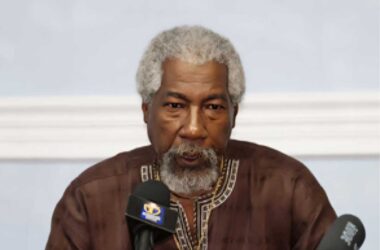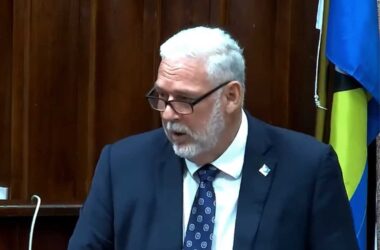
Will Honduras follow Nicaragua to China? And will Saint Lucia and Haiti be the next Caribbean allies to break with ties with Taipei?
These are not questions being asked by Caribbean citizens as much as by those everywhere whose job or function is to convincingly justify and/or defend overall US policy interests globally.
The latest is Evan Ellis, a Latin America Research Professor with the U.S. Army War College Strategic Studies Institute.
Just one month after the historic November 28, 2021 election of the first woman to the Presidency of Honduras and winning the-most-votes-ever by any candidate, Ellis feels free to predict what she’ll do in 2022, even before she takes office.
Honduras Liberty and Refoundation Party (LIBRE) and its victorious presidential candidate Xiomara Castro won over half the ballots cast with over-a-million votes with a national turnout of 68% — also the highest-ever.
President-elect Castro has another three weeks before taking office on January 27 to replace outgoing President Juan Orlando Hernandez.
But even before sitting in the presidential chair, she’s already being pressured, especially by Washington through the likes of Ellis, to not eventually do what the majority of Honduran voters expect her to: deliver on her election promise to recognise the People’s Republic of China (PRC).
In an article entitled Latin America and the Caribbean Predictions for 2022 (published in Global Affairs on December 30, 2022) Ellis speculates that ‘early in 2022,’ the yet-to-be-appointed Castro government ‘will likely’ decide to “seek positive relations with the Biden administration…’
He envisages President Castro ‘may delay’ her campaign pledge to diplomatically recognize the PRC ‘to avoid souring relations with Washington, while seeking to extract more concessions from longtime partner Taiwan.’
And as if to show an even hand, Ellis also speculates that by the end of 2022, ‘more radical actors’ within the ruling Partido Libre, ‘may force’ an eventual break with the Biden administration
He then turned to Nicaragua, which on December 9, 2021 broke ties with Taiwan, supposing the new Beiojing-Managua relationship ‘could also give rise to’ purchases of Chinese military equipment…’
Ellis then extended his predictive speculation and posited that 2022 ‘will likely see’ the Caribbean region become a new area of focus, ‘including the possibility’ of Saint Lucia and Haiti also breaking with Taiwan.
The writer tried hard, with each suggestion, speculation or supposition, to play-it-safe by saying this-or-that might happen.
But the overall essence of his article is that should the new Honduran President deliver on her election promise to recognise the PRC, that would not be in the USA’s geo-political or national security interests.
Nothing in the supposedly predictive analysis looked at the socio-economic conditions in poor Nicaragua or Honduras, Saint Lucia or Haiti, or the natural expectations that elected parties, in office, will deliver on their campaign promises.
Dismissing the social and economic depravations in the poor nations he fingered, Ellis’ only concern was the possible political costs — should President Castro recognise the PRC — to American political and security designs and interests in a region it continues to regard as ‘America’s Backyard.
Eyes only on Taiwan’s geo-strategic importance to US plans in the South China Sea, Ellis only sees the Nicaragua decision — and the likelihoods in Honduras — in similar Monroe Doctrine terms.
By his slippery estimate, Taiwan can lose ties with Honduras, Saint Lucia and Haiti by the end of 2022, leaving Taipei with only 11 international allies – a situation that, by his selective measure, will also represent a weakening of the Biden administration’s political and electoral base ahead of upcoming November 2022 US mid-term elections.
His conclusion: ‘In 2022, the United States will find that after a few initial signs of hope, the hemisphere to which it is intimately bound by ties of geography, commerce, and family is more dangerous, less democratic, less stable, less willing to cooperate, and more engaged than ever with its extra-regional rivals.”
Ellis expectedly applied the all-embracing patent escape clause to remind readers: ‘Predictions are imperfect…’
But he still concluded that ‘It is possible’ that ‘some’ of his ‘anticipated glimmers of hope’ at the beginning of the year ‘will fail to materialize’ and ‘the region will plunge more rapidly into crisis.’
Of course, Ellis wasn’t writing as much for a Caribbean or Latin American audience as for fellow political peers with military backgrounds, or associated with thinking behind promotion of Pentagon and/or military-industrial complex objectives.
That’s why he, like all others still involved in the almost-ancient art of painting China as the evil red dragon the world needs to always be wary of, always simply ignore the conditions facing the people who voted for change and blind themselves to legitimate expectations that elected leaders and their parties will deliver on their campaign promises.
Nothing the new Saint Lucia Prime Minister said on the campaign trail or since being elected has suggested anything about his party’s thinking – and at any rate, unlike those free to publicly speculate and predict (but with safe escape clauses), no government that’s broken ties with Taiwan since 2016 has conducted such negotiations in public, or vice versa.
Pierre, who was always around at every stage of Saint Lucia’s respective formal relationship with China and Taiwan, is also heading the second SLP administration to have inherited ties with Taipei.
Both Beijing and Taipei have had dealings with Saint Lucia and future ties with each other will always be determined by the elected government of the day — and not by speculators spinning New Year predictions like playing roulette.
Ellis and his ilk will continue to look into transparent crystal balls – and (therefore) always end-up with ill-defined or wordless analyses void of any relationship to reality, akin to the formal-but-unofficial Washington policy on Taiwan masked in the ill-defined, invisible and unreliable policy of ‘Plausible Deniability’.
Like with Ellis’ speculations and use of escape clauses, no one can rely in promises that can always be denied…
And That’s The Bottom Line!










